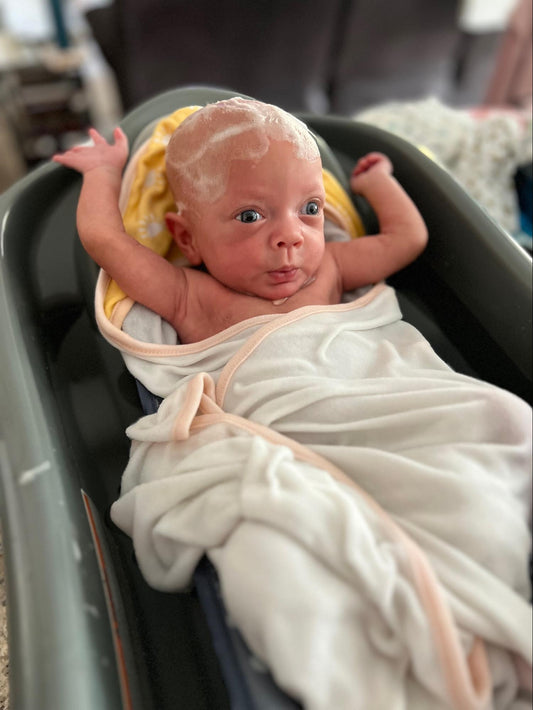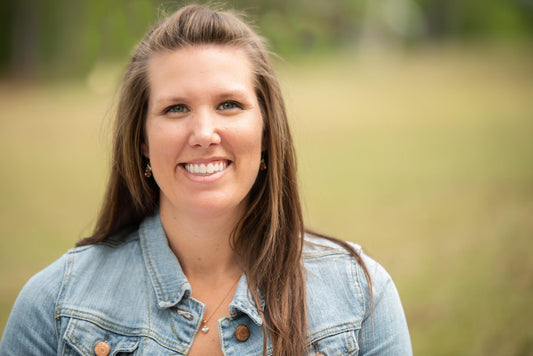Share
Breastfeeding Moms, You Don’t Want to Miss This!
Rohini MoreIf you’re a new or expecting mom (or partner!) and want to know what to expect in the first few weeks of breastfeeding from an expert, read on! You don’t want to miss this.

Sabrina Barber, Registered Nurse, International Board Certified Lactation Consultant, Childbirth Doula and mama of 2
Sabrina Barber is a Registered Nurse, International Board Certified Lactation Consultant and Childbirth Doula with a background in pregnancy, postpartum and pediatric care.
She is also a mother to two children (ages 5 and 2) and experienced significant difficulty with feeding, which fueled her passion to obtain additional training within the lactation support realm.
Her expertise serves families of babies with complex medical histories, oral motor difficulty, tongue ties, and infant food allergies from Orlando, Florida to around the world!
Bonsie is so grateful to Sabrina for sharing her expertise!
Can you tell us a little bit about yourself and why you became a lactation consultant?
My name is Sabrina and I became an International Board Certified Lactation Consultant in 2018. I am a pediatric Registered Nurse with a background in trauma and for the first few years of my career I would see time and time again the life saving effects of human milk. When babies would not tolerate any other food source due to their accident, or they would not respond well to pain medication, nursing was their comfort and nourishment. NICU babies were grown and protected from life threatening infections with their parent's milk and donor milk. So, at the very young age of 23, before I had any children of my own, I decided to embark on my journey to obtain my certification as a lactation consultant. During this time of study I began to have children of my own, which opened my eyes to the true challenges that postpartum families face! Determined to make a difference and be the resource that I NEEDED when I was in the trenches of new motherhood, I worked my way into the prenatal, postpartum and pediatric world. I worked for WIC and Healthy Start as a program specialist director, at one of the largest delivery hospitals in the United States, and now I own my own private practice - Motherly Love Lactation Services - and I am co-owner of Baby BLISS Feeding Collaborative of Central Florida, LLC.
In terms of breastfeeding, what should moms expect within the first few hours of delivery?
The first hour after delivery, also referred to as "the Golden Hour" sets you and your baby up for success in your breastfeeding journey.
After delivery, your baby is placed directly skin to skin on your chest. When left alone, your baby will engage in a series of reflexes that will activate their muscles and sensory system for feeding! Your baby may begin to root, crawl, and search your chest for feeding and may even self-latch! The first feeding provides an outpouring of colostrum due to the hormonal rush of placental delivery. It also lines your baby's GI tract for protection and activates the prolactin receptors in your breast to signal to your body "Baby has arrived!" After this very active time, you and your baby may enter a sleepy phase and rest together after the events of delivery.
In the event that you and your baby are separated, skin to skin can be done with a partner, and you may start to stimulate milk production by hand expression until you and our little one are reunited. Once reunited, your baby should be placed skin to skin on your chest and allow "the Golden Hour" to be re-created!
Why is a good latch so important?
Latch and position is EVERYTHING! When your baby is positioned well for a deep latch, your baby will be comfortable at the breast and receive more milk. The transfer of milk becomes much easier. If the latch is shallow (ie - baby is just latched onto the nipple and not the areola and breast itself), your baby will have to work harder to get their milk. This will result in: longer feedings, less intake, decreased diaper output over time, possible weight gain difficulty. And for the breastfeeding parent (you): sore nipples, possible nipple trauma (cracks, creases, bleeding, bruising, blisters and more).

Breastfeeding should be mutually beneficial relationship. If you are comfy and pain free, your baby gets more milk! No need to "tough it out." Get the latch checked!
What advice do you have for moms for the first few days of breastfeeding?
Remain close to your baby to learn their cues. If your baby is showing cues of being hungry, offer your baby the breast. Ask for support from a lactation consultant to check latch and position to make sure that you are comfortable during the many many feedings that will happen. Ask for support from your partner. Communication is so important! You may be exhausted from delivery. You are not expected to "do it all." Rest, heal, ask for support.
When will mom's milk usually come in and how can they prepare for this?
Milk may transition any day from day 3-7. This is when the colostrum that you began making in the second trimester of pregnancy starts to increase in quantity, becomes less thick and transitions from golden color to the milky yellow/white we all know and see on social media. Your chest may feel heavy, warm and full. Sometimes, if there were interventions in labor (IV Fluids, Epidural, etc) or baby is not feeding frequently, there may be additional swelling in the breasts. We call this engorgement. It does not happen to every parent, but if it does, it is important to know the proper management and how to care for yourself and baby during this time.
The timing of milk transition varies based on the person, medical history, delivery history, breastfeeding management and more. If you suspect that baby is not receiving enough milk at the breast despite proper latch and positioning, please reach out for support.
If mom plans to pump, when should she begin breast pumping?
This answer is very complex and varies based on familial situations. So stick with me here...

If you and your baby are separated immediately after delivery, you should begin hand expressing within the first hour after birth.
If you and your little one have continued separation - pumping should take place within 4-6 hours after delivery, 8 or more times in 24hrs with at least once being overnight.
**The same rules apply for families that plan to pump exclusively and do not plan to nurse.**
If the latch is too painful to nurse, you have nipple trauma, or baby needs additional milk, you should begin pumping under the management of a lactation consultant as soon as possible. They will help you manage how often to pump, timing and the options of how to feed your baby the expressed milk.
If feeding at the breast is GOING WELL, you may allow your little one to regulate your milk supply and postpone pumping for 3-4 weeks. This is the ideal situation to decrease risk of oversupply and promote a consistent relationship at the breast.
Then you may either add in one pump daily for milk storage collection, or to practice paced bottle feeding and partner involvement in this manner.
How often should mom nurse her baby after delivery?
Feed your baby on demand. When your baby shows you feeding cues (yawning, hands to mouth, rooting/turning toward someone or something to latch) place your baby skin to skin and offer a feeding at the breast. Crying is a late feeding cue and sometimes may be hard to latch baby if they are in a heightened state. Calm your baby, then proceed with latching.
If your baby is sleepy, wake them to feed until they at least reach their original birth weight at 2 weeks of life.
Aim for a MINIMUM 8 times in 24hrs.
How does mom know if her baby is getting enough milk?
Watch your baby and not the clock. Count the number of feedings, there should be a minimum of 8 in 24hrs. You want to check the QUALITY of the feeding, not the QUANTITY of the time spent at the breast.
Here are some ways you can check in on the feeding:
- When baby is latched, is it comfortable?
- Do you hear consistent sucks/swallows?
- Have you offered both breasts for the feeding?
- Is baby meeting their goal of diaper output for both pees and poops?
- Does baby seem satisfied after the feeding?
If the answer is "No" or "I'm not sure" to any of these questions, reach out for support!
Why is skin-to-skin contact important for breastfeeding?
Skin to skin has benefits for both you and your baby! We lactation consultants call it the "reset button" as it brings the parent and baby back to a calm state. When your baby is skin to skin, it releases the hormone oxytocin. This is called the "love hormone" to aid in bonding with your baby. But is also responsible for milk release! It helps your milk flow easily into your baby while feeding.
BONUS: get some skin to skin in before a pumping session and watch that milk flow!
Skin to skin also helps regulate baby's temperature, blood sugar, respiratory rate, and heart rate! Have latching difficulties? Place your baby skin to skin to re-activate the reflexes for feeding and latching. Benefits of skin to skin are not limited to breastfeeding in the newborn stage - Your little one is never too old for skin to skin!
What can moms do to help sore or cracked nipples?
Call for support ASAP. Remember: nipple trauma is not normal and early intervention is key. While you're waiting for your visit, work on adjusting latch and position for a more comfortable feeding. If you are pumping, make sure your flange size is fitting correctly and your suction is at the highest COMFORTABLE level. There is no prize for "powering through" pain or discomfort.
Allowing your breast milk to air dry on your nipples has healing properties and will be the first line of healing. You may then use your nipple cream of your choice. Finally, your lactation consultant may recommend a Hydrogel Dressing (like Comfort Gel Pads) depending on the degree of the nipple trauma you have.
Why is it so important for moms to reach out to a lactation consultant if they are experiencing any challenges?
Ideally, families shouldn't have to wait until they are experiencing challenges to seek support. It's always harder to find an Emergency Room while your leg is broken!
Lactation support should be standard of care at prenatal visits and your lactation consultant should be a part of your delivery team!
Choose a lactation consultant that fits your goals, values, and provides culturally competent and unbiased care. Interview more than one if needed to find the right fit! Early intervention can prevent avoidable difficulties of low milk supply, early unintentional weaning and the anxiety/depression that may arise from feeding struggles.
Knowing what to expect with feeding, what is normal vs abnormal and what you can do at home to remedy the situation early and effectively is the goal!
Because of this - I created a prenatal bundle called Ready. Set. Breastfeed! In this bundle, families receive access to:
- PDF Printout of what to expect in the first two weeks - including Feeding Tracker and Diaper Output goals!
- Video library of all the topics we discussed in detail plus the BONUS VIDEOS of Pumping 101, Preparing caregivers to support your breastfed baby, troubleshooting difficulties (hello clogged ducts, mastitis, thrush, milk supply and more!)
- Virtual Consult with ME! Ask me ALL your questions and know when to reach out once your baby arrives!
Knowing you have the support and someone to call will bring you so much peace! I'm Sabrina with Motherly Love Lactation Services, giving you the tools and resources you need to confidently feed your baby!
- FREE content and education on Instagram @motherlylove_lactation and @babyblissfeeding
- Online Workshops (Level Up Pumping Masterclass and Pumping Back to Work are my top requested courses!)
- Virtual visits worldwide
- In-Person visits Orlando, Florida
- Accepting some insurances, so your visit with me may be free!
I'd be honored to be a part of your feeding journey. I look forward to connecting with you at www.motherlylovelactation.com
SAVE 15% site-wide, today only, with code BREASTFEEDING
Share
-
Category:
- All posts





